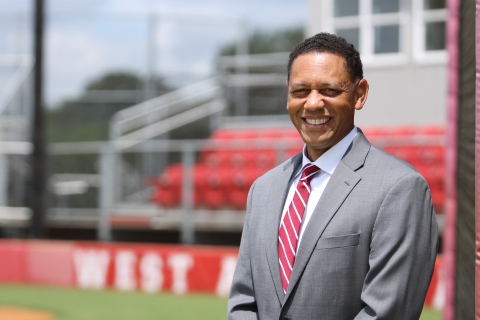
Story: Phillip Tutor | Photo: Betsy Compton
Philadelphia native is passionate about teaching, mentoring — and sports
Dr. LaJuan Hutchinson’s career ascension in higher education makes his attempts at self-deprecation a bit tricky. Awkward, even. Resumes and reputations are hard to overshadow. But he is adamant about this.
He is a nerd.
Proudly, in fact.
“I tell my class I’m a nerd. In sports, I read and look up everything related to it,” he said. “I often tell people that I have the best job in the world because I come to work every day and I get to talk about sports and I get to talk about it from all different levels.”
As an associate professor of sport management at the University of West Alabama, the 55-year-old Hutchinson is renowned for his passion for teaching, a willingness to mentor students, and his admitted love of sports. In May, Hutchinson was selected by the student body for the William E. Gilbert Award, one of UWA’s most prestigious annual honors that recognizes outstanding teaching and excellence in classroom instruction.
But none of this — the teaching, his leadership roles, his UWA career — was preordained, especially his willingness to mentor young people. He’s adamant about that, too.
“It’s intentional only from the standpoint of I feel like that’s what I should do,” he said. “I could say it’s my calling, but I won’t go that far. I just think it’s something I should do.”
Born in Philadelphia and with familial ties in Alabama and Georgia, Hutchinson grew up in Columbia, Maryland, a unique planned community between Baltimore and Washington, D.C. Here’s where he tells on himself, again: “I’ve been called a yankee a few times, actually.” His father was an educator; his mother worked for the federal government in computer technology. Built by a progressive developer in the mid-1960s, Columbia was designed as a collection of self-contained villages intentionally different than the segregated suburban neighborhoods common in many middle-class American cities. In Columbia, where the teen-aged Hutchinson played what may be region’s favorite sport — soccer — race, class, income and religion didn’t organically create segregated enclaves.
“No place is perfect,” Hutchinson said, “but Columbia is known for being multicultural. The whole goal of the city is that people will live next to each other, those who have high income versus those who have low income, it doesn’t matter. You all go to the same schools, so I grew up that way. I grew up knowing all different backgrounds. To be exposed to that, that was a great thing.”
Hutchinson’s path from Columbia to Livingston, or from high school graduate to sports management professor, wasn’t linear; detours and sidebars intervened. He could have studied at the University of Maryland, Howard University or Bucknell University. He instead followed friends to Morehouse College, the historically Black men’s liberal-arts school in Atlanta. He majored in biology, a pre-medicine track, but those seeds didn’t take root.
He remained in Atlanta after earning his bachelor’s degree, volunteering as an athletic trainer for Morehouse’s football team and working at the fitness center at the Ritz-Carlton Hotel. By then, his heart had roamed — no more biology, no more pre-med — and his academic focus meandered. The Ritz-Carlton gig, seemingly benign, proved crucial. “It was eye-opening,” he said, “and it kind of started me on the path to fitness health business. I learned a lot just working there.” He found his path, earned a master’s degree (Florida State University) and doctorate (University of Alabama), and directed the athletic facility at the Mercedes-Benz manufacturing plant in Vance for a decade.
“I also pride myself in making sure that African-American males understand what’s ahead for them and how maybe, just maybe, you can overcome any of the challenges or obstacles that are out there. “
— UWA Sport Management Associate Professor LaJuan Hutchinson
That sports management, not athletic training, is his career focus illustrates the professional evolution of a self-styled sports nerd who enjoys the business of athletics as much as the games themselves. That doesn’t mean his sporting passions are dormant, because they aren’t — the eternal quest to lower his golf handicap, the Sundays cheering for his favorite NFL team, the recently rebranded Washington Commanders, and the rare occasions to kick a soccer ball for old time’s sake.
“I know a lot about physical fitness, and health in general, but then it just seemed like I started to learn more about business, as well,” he said. “So the final the culmination of everything is that there’s this thing now called sports management where it’s about business, but it’s also about knowing sports and everything that goes behind it.” Often in his classes are students who want to coach or work in off-field roles with athletic departments or professional teams.
The makeup of UWA’s student population — a prevalence of first-generation students and those from lower-income backgrounds in Alabama’s Black Belt and eastern Mississippi — isn’t lost on Hutchinson, the educator’s son who serves as a member of the West Alabama Multicultural Alliance. The influence of his diverse upbringing in Maryland and his Philadelphia beginnings doesn’t stray from his core.
“I know the importance of education among African-Americans because I went to an all-male college with Spelman College, all-female, right next door,” he said. “But I also pride myself in making sure that African-American males understand what’s ahead for them and how maybe, just maybe, you can overcome any of the challenges or obstacles that are out there.
“It’s funny, too. You have your perceptions of the South. And I would say what I thought of the South was not correct. I love it here. I’ve been here over 30 years. It’s home to me now. Since I’ve seen something a little bit different, I think I bring that to the table to a lot of my students.”